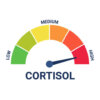
For many patients living with Irritable Bowel Syndrome (IBS), the winter months can bring more than just cold weather and shorter days; they also bring an unwelcome increase in gut symptoms. If you’ve ever wondered why your bloating, constipation, diarrhoea, or abdominal pain seems to flare as soon as the temperature drops, you’re not imagining things.
Winter can influence gut health in surprising and significant ways. From comfort eating to holiday stress, reduced sunlight to disrupted routines, it’s a season that can subtly (or not so subtly) throw your digestive system out of balance.
In this article, we’ll explore the many reasons why IBS often worsens during winter, and more importantly, what you can do to manage symptoms and protect your gut health through the colder months.
How Winter Affects IBS Symptoms
IBS is a complex, individual condition that’s influenced by a range of physical, emotional, and environmental factors. So it makes sense that a seasonal shift, particularly one as significant as winter, could disrupt that delicate balance.
During winter, many people report:
- Increased bloating or discomfort
- More constipation or diarrhoea
- Heavier meals that trigger symptoms
- Changes in sleep, mood, and routine
While the causes can vary from person to person, the pattern is common. Winter has a way of nudging us out of our gut-supportive habits, and the result is often an increase in IBS flare-ups.
Let’s take a closer look at why that happens.
Temperature and Its Impact on Digestive Health
Cold weather may affect your gut more than you think.
In lower temperatures, your body diverts energy to keep you warm, often pulling blood flow away from the digestive tract. This can lead to slower digestion, which may explain why some people feel more bloated or sluggish after meals in winter.
Additionally, cold exposure can trigger the sympathetic nervous system — our “fight or flight” mode. For sensitive individuals, this can cause the gut to become more reactive or prone to spasms, particularly if stress is already a contributing factor.
Some people also experience increased gut sensitivity in cold weather, meaning that normal digestive processes may feel more uncomfortable or exaggerated than usual.
Changes in Diet and Eating Habits During Winter
Winter eating tends to look different, and not always in a way that supports gut health.
Hearty, rich, and comforting meals become the norm, while fresh fruit, fibre, and hydration often take a back seat. Common winter dietary shifts that may affect IBS include:
- Higher fat intake: Creamy soups, roasts, and buttery sides can trigger bloating and diarrhoea in some.
- Reduced fibre: Less access to salads and seasonal fruit may lead to slower digestion and constipation.
- Increased FODMAPs: Many traditional winter dishes contain ingredients like onion, garlic, lentils, or dried fruit — all common IBS triggers.
- Alcohol and sugary treats: Festive drinks and desserts can be a gut irritant, especially in large quantities.
While there’s absolutely a place for indulgence and enjoyment, the cumulative effect of these changes can tip the gut into imbalance.
Reduced Physical Activity in Cold Weather
Movement plays a crucial role in gut motility, helping to keep everything flowing smoothly. But when the weather turns cold and daylight hours shrink, many people naturally move less.
Reduced physical activity in winter can contribute to:
- Sluggish digestion
- Increased bloating
- Constipation
- Heightened stress (due to fewer endorphins)
For those with IBS-C (constipation-dominant IBS), this can be particularly noticeable. Even a short daily walk can help stimulate digestion, so the drop in movement during winter can have a tangible effect on symptoms.
The Role of Stress and Holiday Pressure on IBS
Winter can be a magical time, but it can also be overwhelming.
From navigating social events and family gatherings to managing gift shopping and end-of-year work stress, it’s a season that often demands a lot. For people with IBS, emotional stress and pressure are closely tied to symptom severity.
This is largely due to the gut-brain axis, the two-way communication system between the digestive tract and the brain. When stress levels rise, gut motility, sensitivity, and inflammation can all increase — leading to more flares.
Even positive events can bring pressure (think: hosting, travel, or trying to please everyone), and these mental and emotional burdens can quietly stir up gut symptoms.
Impact of Winter Illnesses on IBS
Winter is also cold and flu season, and the illnesses that circulate can take a toll on your gut.
Viral infections, even mild ones, can cause inflammation in the digestive tract, disrupt the microbiome, and lead to temporary or long-lasting changes in gut function. Common issues include:
- Post-infectious IBS: After a virus, some people develop IBS symptoms that linger for months.
- Antibiotic use: While often necessary, antibiotics can disrupt gut bacteria and lead to bloating, loose stools, or food sensitivities.
- Fever, dehydration, and fatigue: These symptoms can slow digestion and exacerbate existing IBS issues.
Your gut is part of your immune system — so any winter illness can have downstream effects on how you digest, absorb, and eliminate food.
Vitamin D Deficiency and Its Link to IBS
Sunlight exposure naturally decreases in winter, and with it, so does your body’s ability to produce vitamin D.
This matters for IBS because vitamin D:
- Helps regulate inflammation
- Supports gut barrier integrity
- Influences microbiome composition
- Plays a role in immune function
Low vitamin D levels have been linked in some studies to worse IBS symptoms, particularly in people with fatigue, mood changes, and gut discomfort. In the UK and similar climates, vitamin D deficiency is common during winter, especially in people who spend most of their time indoors.
Testing and supplementation can make a big difference for those affected.
How Changes in Sleep Patterns Affect IBS
Winter can disrupt your natural circadian rhythm in subtle ways. Shorter days and longer nights often mean:
- Going to bed later
- Waking up in the dark
- More screen time before bed
- Less time outdoors (and less melatonin production)
These changes can impact your sleep quality, and poor sleep has been strongly linked to increased IBS symptoms. Even a few nights of restless sleep can lead to heightened pain sensitivity, mood changes, and less efficient digestion.
If you’re noticing more gut issues and also sleeping poorly, the two may be more connected than you think.
Managing IBS During the Winter Months
Winter may come with its challenges, but the good news is that many IBS triggers during this season are predictable and manageable with a few simple strategies.
Here are some ways to support your gut as the seasons change:
- Stay consistent with meals: Try to maintain regular eating times and portion sizes.
- Balance your plate: Include fibre, protein, and healthy fats to stabilise digestion and energy.
- Drink warm fluids: Herbal teas or warm water with lemon can soothe the gut and support hydration.
- Keep moving: Even gentle movement — like stretching or walking indoors — helps with motility.
- Prioritise rest: Create a calming bedtime routine and limit screen time before sleep.
- Support your microbiome: Fermented foods, prebiotic fibres, and targeted probiotics may help.
- Manage stress: Set boundaries around holiday obligations and include time for quiet or restorative practices.
Tips for Preventing IBS Flare-ups in Winter
Proactive care can make all the difference. Here are some practical tips to help you stay ahead of winter IBS flare-ups:
- Meal Prep Gut-Friendly Comfort Foods
Soups, stews, and slow-cooked meals can be soothing — just choose low-FODMAP ingredients if needed.
- Take a Vitamin D Supplement
Especially if you live in a region with limited sunlight, consider testing and supplementing accordingly.
- Watch the Alcohol and Caffeine
Both can irritate the gut, especially on an empty stomach. Moderation is key.
- Dress Warmly and Layer Up
Cold exposure can trigger gut spasms in some people, keep your core warm to help prevent sudden symptoms.
- Use a Hot Water Bottle or Heat Pack
Gentle heat can soothe abdominal pain or cramps when flares do happen.
- Schedule Quiet Time After Meals
Rushing straight into tasks after eating can increase bloating – give your gut a chance to digest.
- Reach Out for Support
Whether it’s a dietitian, therapist, or GP, having someone in your corner makes winter feel more manageable.
Conclusion
While IBS may feel more challenging in winter, you’re not powerless, and you’re definitely not alone. The season brings predictable shifts in lifestyle, diet, and emotional load, all of which can influence gut health. But with awareness and gentle self-care, it’s possible to move through winter feeling more in control and less reactive.
Your gut deserves patience and support, not pressure or restriction. So this winter, take a little extra time to check in with your body, adjust your routine, and prioritise the habits that help you feel well, whatever the weather is doing outside.
References
Hartford HealthCare – 5 Reasons Your Digestion Is Worse in the Winter
PubMed (NCBI) – Psychological distress and seasonal symptom changes in irritable …
Yahoo Lifestyle – How winter can make IBS flare up
JUVIA – Does IBS Change with the Seasons?
Gastropediatrics – Post-Infectious Irritable Bowel Syndrome in Winter
Northeast Digestive Health Center – Dealing with Winter Stomach Pain
Flushing Out IBS – IBS Facts – Winter can be particularly difficult …
Wikipedia – Low-FODMAP diet
Wikipedia – Irritable bowel syndrome
A Little Bit Yummy – Is Your Fatigue and IBS Linked to Low Vitamin D?
Last Updated
Uploaded by Martin Cohen on 08/09/2025






